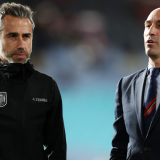
Almost four years ago to the day, FIFA announced that it would expand the Women's World Cup to 32 teams for the 2023 edition. The move was designed to "foster the growth" of the women's game, as president Gianni Infantino described it, and it was met with plenty of fanfare. It also came just weeks after the U.S. women's national team infamously opened their 2019 World Cup campaign with a 13-0 win over Thailand.

Golazo Starting XI Newsletter
Get your Soccer Fix from Around the Globe
Your ultimate guide to the Beautiful Game as our experts take you beyond the pitch and around the globe with news that matters.
Thanks for signing up!
Keep an eye on your inbox.
Sorry!
There was an error processing your subscription.
There was no question the gap was closing at the top of the sport, which is why many believed the 2023 edition of the tournament would be the most competitive yet. The expanded field was also inherently good for the rest of the world since it came with the hope of more investment. The big question, though -- would the lower-ranked teams at the 2023 World Cup be ready for the spotlight?
After a group stage for the ages in Australia and New Zealand, the answer is a resounding yes.
Take Jamaica as a prime example. The Reggae Girlz qualified for their first World Cup four years ago and lost 3-0 to Brazil in their tournament debut. They did not pick up a single point in 2019, conceded 12 goals and scored just once. The contrast with 2023 couldn't be starker -- Jamaica may not have scored more goals this year, but they earned five points, three clean sheets and sent Brazil home in a 0-0 draw.
Their success is part of a larger trend. There was no 13-0 result to speak of during the group stage and no match got close to that tally. Less than 15% of all matches were won by more than four goals in 2023, which is nearly equal to the almost 14% in 2019 despite adding 12 more games to the schedule. Most teams were competitive until the final day of the group stage, too -- only five squads were eliminated after playing two out of their three group stage matches. Many lower-ranked teams left heavy hitters stumped at times, leaving few teams unscathed as they advanced to the next stage. Three teams -- Jamaica, South Africa, and Morocco-- are in the knockouts for the first time, while three are there for only the second time.
The action has been unpredictable and thrilling and has delivered on major moments that make World Cups special. This tournament met its promise before a single knockout match was played and cemented its legacy as a watershed moment for women's soccer in quick fashion. It also did so against the odds.
It was easy to predict that the later rounds would be uber-competitive -- women's national teams and leagues in the United States and Europe have received more investment and eyeballs over the last four years. The same is true for teams like Jamaica, but to a lesser degree. The Reggae Girlz went without pay and enough training sessions before the World Cup and needed a GoFundMe campaign to fund the trip to Australia. Nigeria, in the knockouts for the second time, protested a pre-tournament friendly over withheld payments.
Similar problems exist at both ends of the spectrum, too. Haiti, who only conceded one goal to England in their first-ever World Cup match, played just 19 matches in the last four years and are dealing with FIFA's botched response to a sexual abuse scandal. The Lionesses, meanwhile, paused their dispute over World Cup bonuses to concentrate on the tournament.
These are only a handful of stories of the players at the World Cup, but their admirable play and ability to perform despite the obstacles forces the question -- how good might these teams be if they received adequate or equal funding?
That is the question the sport's organizers need to grapple with to ensure the legacy of the 2023 World Cup is not a flash in the pan but a true sign of things to come. A little investment can go a long way, but resting on one's laurels can prove to be costly quickly. Look no further than Canada, who won Olympic gold just two years ago but failed to make the knockouts Down Under. Captain Christine Sinclair described the elimination as "a wake-up call for our federation" and its lack of investment in a professional league and the youth national teams.
Sinclair perhaps offered a smart first suggestion on how to continue the legacy of the 2023 World Cup -- year-round commitment to women's soccer and the emerging talents who await the opportunity to impress at the highest levels. Hopefully, the impact of this tournament is that the sport's organizers finally listen.
















